Jan 2019
Jan 2019 vuyelwan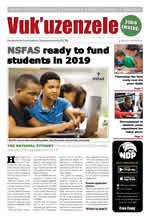
Translations
A deserved raise for KZN CCGs
A deserved raise for KZN CCGs JoyPresident Cyril Ramaphosa recently signed the Minimum Wage Bill into law which prompted the KwaZulu-Natal health department to raise the stipend for key workers.
Over 1 000 Community Caregivers (CCG) from KwaZulu-Natal have received an increase in their stipend from R1 500 to R3 500.
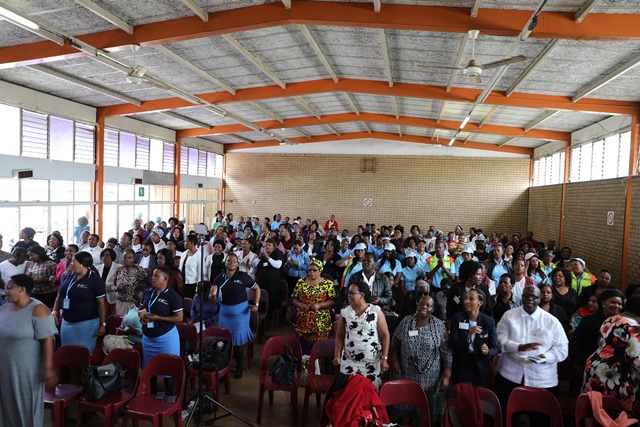 peaking at a ceremony in Pietermaritzburg to officially announce the stipend increase, KwaZulu-Natal Health MEC Sibongiseni Dhlomo said the province’s 10 771 CCGs were working hard in taking primary healthcare services to poor people’s homes.
peaking at a ceremony in Pietermaritzburg to officially announce the stipend increase, KwaZulu-Natal Health MEC Sibongiseni Dhlomo said the province’s 10 771 CCGs were working hard in taking primary healthcare services to poor people’s homes.
KwaZulu-Natal's CCGs visit people’s homes, and provide various services such as facilitating treatment for chronic patients; identifying and tracing those who default on medication and referring them to doctors.
They also test girls aged 15 and upwards for pregnancy.
This alone has helped to significantly increase the number of women who present for early antenatal booking at clinics. This means that any underlying illnesses which could affect the pregnancy are diagnosed early.
“CCGs received a stipend of R1 500. Despite earning that little, they would sometimes get to certain homes and find that a patient has not eaten,” said MEC Dhlomo.
“From the little that they have, they would buy bread or maas for the gogo and give her pills. In some instances, they would help buy soap to help the elderly wash their clothes. So, these are people who have a calling,” she said.
“The government had talks with the workers and a decision was reached on the minimum wage for everyone, which was R3 500.”
MEC Dhlomo also congratulated those former CCGs who took opportunities to upgrade their careers, and are now nurses and nutrition advisors.
Former CCG Bongi Nzimande, from the Ngubeni area in Pietermaritzburg, was among those who thanked the government for bringing change and dignity into their lives.
She said working as a CCG motivated her to further her studies at the University of KwaZulu-Natal after receiving a bursary facilitated by the department for her to do a one-year course in nutrition.
After completing her course, she started working as a nutrition advisor.
“I was able to buy a second-hand car for my mother within a short period of time. And with the passing of time, I also bought building materials and built my mother a home,” she said.
“Today, I earn a decent income. I'm thankful to the government for this opportunity and all the support," she said.
Apply for school placement on time
Apply for school placement on time vuyelwanParents must ensure that they find a school for their children a year before their children are due to start school.
The work in placing children at schools for 2019 has already been completed. Department of Basic Education spokesperson Elijah Mhlanga said parents always need to apply for placements the year before their children are due to start school.
“Parents should apply for placements in the first term, with the last day for applications usually being the end of the term. The admission process begins at the start of the second term in April and extends to the end of August. Each year, the placement of learners for the following year should be finalised between October and November.”
It is also important for parents to apply to several schools, to increase the chances of their children being placed. 
“Parents also need to check the registration deadlines of their provinces, as these may differ slightly from other provinces,” Mhlanga advises.
He added that the South African Constitution states that all children between the ages of 7 and 15 need to attend school, which places a responsibility on the department to ensure that all learners are enrolled.
Mhlanga said that parents of children who haven’t been placed should urgently contact their provincial and district education offices.
“Parents are encouraged to contact district offices for assistance in placing learners. It allows them to register learners at other schools within the district that have enough space to accommodate learners.”
There are currently more than 70 district offices in all nine provinces.
Documents needed when making an application for your child include:
- Birth certificate
- Immunisation card
- Transfer card or last school report card for learners who have been to school previously.
For further assistance, parents can contact their provincial learner admissions coordinators.
Provincial contacts
Eastern Cape:
Ms HN Buhlungu
040 608 4442
083 361 9464
nobom.buhlungu@edu.ecprov.gov.za
Free State:
Mr Thloriso Motholo
051 447 4038
079 503 5955
ThlorisoMotholo@gmail.com
Gauteng:
Ms Sybil Paddy
011 355 0656
082 927 9584
Sybil.Paddy@gauteng.gov.za
KwaZulu-Natal:
Mr Sbu Kheswa
033 348 6115
082 922 4046
Sbu.kheswa@kzndoe.gov.za
Limpopo:
Mr M Mulaudzi
015 290 9441
079 511 8494
mulaudia@yahoo.co.uk
Northern Cape:
Mr ABF Malunga
053 839 6808
083 736 7077
abfmalunga@gmail.com
North West:
Dr M Teu
018 397 3097
079 515 6269
mteu@nwpg.gov.za
Mpumalanga:
Mr BC Nkwinika
013 766 0940
061 358 0200
b.nkwinika@education.mpu.gov.za
Western Cape:
Mr L R Abrahams
021 467 2364
082 654 2131
Lance.Abrahams@westerncape.gov.za
Avoid the January blues
Avoid the January blues tsoanaOverspending during the festive season can put a major strain on your finances, especially once the January bills arrive.
Getting caught up in the joy and giving that comes with the festive season often results in people heading off to financial institutions or loan sharks in January to borrow money. And this, quite simply, is how their debt spirals out of control.
According to DebtSafe’spokesperson Matthys Potgieter, people cannot clear their debt without a proper strategy and financial planning. He recommends that you consider the three ‘finan cial Rs’ as part of your New Year’s resolutions. “The three financial Rs are recover, restore and renew,” he said.
cial Rs’ as part of your New Year’s resolutions. “The three financial Rs are recover, restore and renew,” he said.
Potgieter recommends that you pre-plan your new financial journey so that you don’t repeat the steps taken in previous years. “The best way to start your recovery process is to outline your financial goals for 2019. This includes those realistic short- (birthday party), medium- (vehicle finance) and long-term (retirement) goals,” he said.
To restore, do your homework when it comes to what worked in your life financially and what did not. “If, for example, you used to have an outlined monthly budget but started to avoid it - why not start again and set it up in a simpler manner that will work better for you?” Then it’s time to recover. “A new year is supposed to reflect a fresh start, so try to create a debt-free beginning for yourself,” said Potgieter. “Check your bank statements and know where your debt burdens are and decide how you can start paying your debt back.”
Avoid loan sharks turning to loan sharks in January is the worst thing you could do, as loan sharks operate outside of the country’s laws that govern the extension of credit. They therefore charge interest rates that are much higher than the maximum cap allowed by the National Credit Act (NCA).
If you do have to fall back on credit, rather turn to a registered financial services provider that’s regulated by the NCA. This will ensure that you get the best interest rate.
Tips to beat the January blues
• Prioritise your home loan or rent.
• Before you cancel any insurance, speak to a financial advisor.
• If you borrow money, make sure you borrow only for what is strictly necessary, and ensure that you can afford the repayments.
• If you are battling with your debts, contact a registered debt counsellor for assistance.
• Keep to your normal spending patterns.
• Don’t make drastic changes that may leave you over-indebted.
• Avoid new debt.
• Avoid ‘buyer’s remorse’. Make a list of items you want to purchase before going to the stores to avoid compulsive shopping.
• Compare prices to get the best deals.
Be safe in the water
Be safe in the water vuyelwanThe South African Police Service (SAPS) in KwaZulu-Natal is urging locals and holiday makers to be extra cautious when swimming in pools, the ocean and dams.
This warning comes after a number of people have recently drowned in the province.
The SAPS said educational campaigns have been carried out to promote safety at recreational facilities and by the sea.
As the festive season approaches, drowning is an ever-present risk when people go on outings to rivers, beaches, dams and swimming pools.
The SAPS added that many incidents of drowning are linked to the misuse of alcohol and recklessness.
Water safety tips
- Check the weather and the tides before you leave home – if the sea is too rough, you could be swept away.
- Only enter where the waves are straight and gentle.
- If you experience a strong current, get out of the sea, or at least do not go in deep.
- Never swim while you are intoxicated. Alcohol impairs judgement and unnecessary risks are taken. An intoxicated swimmer will tire more easily, increasing the chance of an accident and drowning.
- Check with the lifeguards on duty what the surf conditions are before entering the sea.
- Only swim in designated areas that are supervised by lifeguards.
- If the lifeguards give you directions or instructions from the beach, obey them.
- Look out for warning signs and flags – a red flag means it is dangerous to swim.
- Avoid swimming immediately after a big meal, as there is a danger of having cramps.
- Do not dive into shallow seawater this can put you at risk of damaging your neck, especially if you are diving into a shallow pool and dam.
- Do not swim in river mouths, in dirty water, very early in the mornings, early evenings or after it had rained as shark activity increases in these conditions. Do not swim when bluebottles are present as they are poisonous.
- Never leave a young child unattended near water and never make a child responsible for another child – not even for five minutes. Teach children to always ask permission to go near water.
- If a child is missing, check the water first. Every second counts in preventing drowning or permanent disability.
Choosing the best early care for your child
Choosing the best early care for your child JoyThis is the time of year when it's back to school for most children. But for some, it will be the first time they leave the comfort of home for school.
 Early childhood development (ECD) is a programme offered to children from birth to school-going age that focuses on the physical, emotional, mental reasoning and social development of a child.
Early childhood development (ECD) is a programme offered to children from birth to school-going age that focuses on the physical, emotional, mental reasoning and social development of a child.
Children go through remarkable growth with brain development at its peak at this stage. It is therefore important that they receive the correct stimulation.
The National Development Agency (NDA) offers expert advice on what parents should look for when enrolling their children at ECD centres in line with compliance matters, such as registration, safety and security, learning methods and teacher training.
The NDA is an agency of the Department of Social Development.
Tips for parents when looking for an ECD centre:
It is important for an ECD centre to be registered and meet all the norms and standards. A registration certificate must be displayed on the wall for parents to see.
Safety and play
- The safety of children is key. The ECD centre must have a fence, wall and lockable gate.
- There should be enough space in the yard for play equipment. This includes jungle gyms, swings and other equipment which are vital for the development of a child's movement skill.
- The building sturcture of the ECD centre must be safe. There must be enough windows and two emergency exits in case of a fire or other emergencies.
- Parents must provide the ECD centre with accurate and full information to enable the ECD centre to generate communication systems in cases of an emergency.
Learning
- The number of children allocated in a classroom is an important factor. Children should be allocated according to their age groups. For example, zero to six months must be in one group.
- Each child should be allocated a place to sit. Classrooms must have enough tables and chairs to accommodate the learners.
- Parents should ask to see the layout of the classroom. There should be various activity areas that are compulsory. These include a fantasy corner, a fine motor development area, an art cognitive development area, a bag area and a ring area. Walls should have charts showing shapes, colours, numbers and a daily programme of activities.
- The number of staff in the ECD centre is key. Each class must have a qualified practitioner who is with the children all the time. The other ECD centre staff, such as a cleaner or cook, may not replace teaching staff.
Activities of daily living
 The ECD centre must have sufficient toilets for the children. They should be sized properly and have a wash basin and towels that children can reach.
The ECD centre must have sufficient toilets for the children. They should be sized properly and have a wash basin and towels that children can reach.
Nutrition
Nutrition is key to learning. There must be an alternative and seasonal menu of the week with a variety of food groups displayed in the kitchen. It is also important for parents to enquire whether meals are provided by the ECD.
School readiness
Following a holistic ECD programme, children advance from an ECD centre to Grade R, not only when they have reached the Department of Basic Education's prescribed age, but especially when they have achieved the following:
- The child must be able to run, jump, skip and walk up the stairs. Physical education helps to develop these skills.
- Fine motor development focuses on small muscles where the child is able to hold a pen. The child should be able write his name and participate in activities that involve the use of hands and fingers.
- The child should be able to share space with other children and participate in group activities. They should be able to follow school rules.
- A child ready for grade R should be able to identify numbers, count from one to 20. They must know the four basic shapes- namely, square, circle, rectangle and triangle.
- A child's creativity is vital. Children at this age should be able to draw pictures, sing songs and rhymes, play make-belief games or stories, dance and play.
- These children should be able to speak and listen along, and be able to construct a sentence.
- ECDs also help develop the independence of a child where they are able to go to the toilet alone, eat on their own, dress themselves and tie their own shoe laces and be responsible for their property. At this stage, they should know their names and those of their parents.

This information was supplied by the National Development Agency.
Don’t despair, there is a second chance
Don’t despair, there is a second chance tsoanaIf you did not do well during your matric year, don’t despair, there is a second chance to obtaining your goals by rewriting matric.
The Basic Education Department (DBE) has announced that as from January 2019, supplementary exams will no longer take place in March but rather in June. This will also give learners the opportunity to rewrite as many subjects as they want as opposed to the former two subjects allowed. Another major reason for the change is thorough monitoring of the system.
to rewrite as many subjects as they want as opposed to the former two subjects allowed. Another major reason for the change is thorough monitoring of the system.
The department noted that on average around 40 000 learners who enrol for supplementary examinations every year do not turn up to write the examinations. This results in massive wasteful expenditure. Writing supplementary exams in June also gives learners enough time for revision and learners can make use of the comprehensive support material provided through the Second Chance Matric Support Programme.
The aim of the Second Chance Matric Programme is to provide support to learners who have not been able to meet the requirements of the National Senior Certificate (NSC) or the extended Senior Certificate (SC).
Who can receive assistance from the Second Chance Programme?
- Learners who wrote the NSC the previous year, but did not sit for all six subjects should be able to rewrite the examinations for the outstanding subjects in June.
- Senior Certificate Examination Candidates: Learners registered to write the Senior Certificate examinations in June. Registration for the 2019 exams is already open and will close on 31 January 2019.
- NSC Examinations Parttime candidates: Learners who attempted the NSC examinations post 2015 and will write the examinations in November. Registration for the 2019 NSC exams will open in the first week of January and close on 15 March 2019.
How to deal with failure
- First, just accept how you feel.
- Remember: you’re not a failure just because you had a setback.
- Be constructive and learn from this situation.
- Remind yourself: anyone who wants to do things of value in life will fail.
- Move forward again, don’t get stuck in mulling this situation over for too long. [positivityblog.com]
Egg producer cracks the mainstream market
Egg producer cracks the mainstream market JoyFor almost 20 years, a black-owned egg producer has been consolidating its market share through hard work and hands-on management.
Working as a packer and then being promoted to manager at egg producer Nulaid, hatched Seo Mtetwa’s entrepreneurial vision-and today the 57-year-old is the owner of Nu Dawn Eggs.
Initially the business was part of the Nulaid division of Pioneer Foods but in 2001 when it was made available for sale to employees of Pioneer, Mtetwa and four colleagues snapped up the offer.
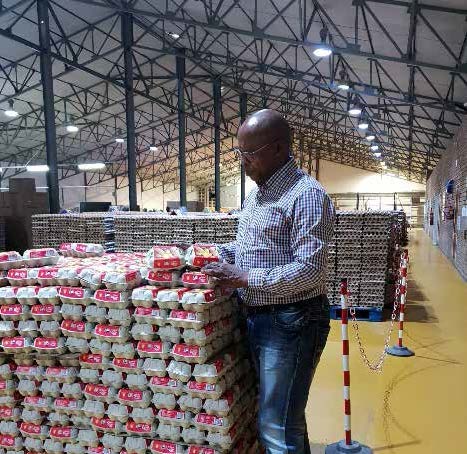 They renamed their business uKhahlamba Poultry Farm and during their first years of operation, they supplied table eggs solely to Pioneer Foods. This changed in 2008 when they decided to sell their eggs directly to the market, under the brand name of Nu Dawn. The period heralded other changes, including the withdrawal of a number of shareholders. This left Mtetwa as the majority shareholder, with Philani Dlamini holding the remaining shares. Thus, the company became 100 percent black-owned.
They renamed their business uKhahlamba Poultry Farm and during their first years of operation, they supplied table eggs solely to Pioneer Foods. This changed in 2008 when they decided to sell their eggs directly to the market, under the brand name of Nu Dawn. The period heralded other changes, including the withdrawal of a number of shareholders. This left Mtetwa as the majority shareholder, with Philani Dlamini holding the remaining shares. Thus, the company became 100 percent black-owned.
Based in Winterton in KwaZulu-Natal, the company has enjoyed good market penetration in its home province as well as the Eastern Cape. It supplies eggs to big supermarkets such as Spar, OK Foods, Boxer, Cambridge Foods and Jwayelani Supermarkets.
Mtetwa, who is president of the KwaZulu-Natal Poultry Institute, told Vuk’uzenzele that he had always dreamt of becoming an entrepreneur and deciding to market their own eggs gave him the momentum to crack on. Today, 146 local employment opportunities have been created and the company has satellite branches in Westmead, Pinetown and Kokstad.
“We have a poultry count of 400 000 and 360 000 eggs are laid daily. We buy 18-week old pullets and keep them for 54 weeks in egg production before selling them in bulk at 72 weeks. Each hen produces around 293 eggs during its 54
weeks at the farm,” he said.
Mtetwa said his success is largely due to the mentorship he received from other farmers. Apart from poultry, Mtetwa raises sheep for meat production.
He encourages young people to study agriculture because there are many opportunities in the sector.
First-time voter encourages peers to vote
First-time voter encourages peers to vote vuyelwanRegister to vote
Ponalo Notwane says exercising his right to vote during this year’s General Elections will give him a voice as a young South African.
Vuk’uzenzele has been following the 21-year-old Notwane who will be voting for the first time in 2019.
He believes that participating in the voting process is important for him and others who will be voting for the first time.
“I have hope that through my vote, a political party that will lead our country after elections will take a lead in fighting against youth unemployment and also tackle the crime rate in our communities,” said Notwane, who hails from Klerksdorp in the North West province.
He said young people should show interest in politics, economics and issues of governance because these affect their daily lives.
“Most young people tend to ignore what is happening in the political and economic space because they still enjoy the comfort of being under parental care, but before they realise it, they will be independent and start to feel the pain of not participating in things like voting,” he said.
During the 2016 local government elections, Notwane was at his hometown and did not see many young people visiting voting stations to cast their votes. This made him realise that not many of them are interested and he was not impressed.
“I felt that it is wrong to always complain about what government is not doing right, yet young people do not want to vote or have a say about who should be leading the country,” he said.
According to the Independent Electoral Commission of South Africa (IEC), there are currently about 26.1 million registered voters on the national common voters’ roll.
It is hoped that at least one million voters will be added to the voters’ roll ahead of the 2019 elections.
The IEC announced that the final registration weekend is set for 26-27 January.
About 22 932 voting stations across the country will open their doors from 8:00 to 17:00 to allow first-time voters to register and others to update and check their registration details.
Notwane thinks that in order for service delivery to improve, people who qualify to vote should play their part in voting leaders of their choice into
power.
From Tembisa to the sky
From Tembisa to the sky JoyA young pilot is making a name for himself on the South African horizon.
Nkululeko Sokweba believes that if he can make his dreams come true, so can you.
 The 25-year old from Tembisa has fought all of the challenges in his life to become a qualified commercial pilot.
The 25-year old from Tembisa has fought all of the challenges in his life to become a qualified commercial pilot.
Sokweba is from Madelakufa informal settlement in Tembisa in the East Rand, Gauteng. He currently works as a flight instructor at Thompson’s Aviation at Wonderboom Airport in Pretoria.
Sokweba was four-years-old when his passion for flying was born. His father was a cleaner at the then Jan Smuts International Airport (now OR Tambo) in Johannesburg, and he would often take him and his two sisters to work.
“In 1997, the South African Olympic team plane would fly over our house which was near the airport. It was a Boeing 747-300 'the queen of the skies' and specially designed for the team. It was the most beautiful thing I’d ever seen,” he recalled.
In 2011, he completed matric as one of the top three students in the school, and received a bursary from the Gauteng City Region Academy, a branch of the Gauteng Department of Education responsible for promoting skills development.
He enrolled to study education at Wits University but continued to look for funding for aviation studies.
In 2014, he applied and was chosen for the South African Airways (SAA) Cadet Pilot Programme. After many weeks of tough theoretical and practical training, he took his first flying lesson on 15 March 2015.
Aspiring pilots must fly a minimum of 35 hours to receive a student’s pilot licence. To gain a private pilot’s licence, pilots must fly a minimum of 45 hours, while a minimum of 200 hours is needed to receive a commercial pilot’s licence.
Sokweba’s favourite aircraft is the Airbus A340-600, which he had the chance to fly from Cape Town to Johannesburg earlier this year.
“I was assigned to fly the plane one night, and I had to fly over our house in Tembisa. It was a great feeling, flying over my home,” he said.
Sokweba, who does not have his motor vehicle driving licence, said many people had told him he would never become a pilot, because no one had ever seen a black pilot before.
“I want people to know they can do anything they want to do. This proves that we can be anything we want to be if we go for it.”
Getting WC athletes Olympic-ready
Getting WC athletes Olympic-ready tsoanaA major upgrade of a district sports complex in the Overberg area means that top athletes and those who simply love sport now have a wonderful facility to call their own.
The Overberg’s most talented young athletes are one step closer to reaching the top after the upgraded Glaskasteel Sports Complex in Bredasdorp was officially re-opened recently, following a R700 000 refurbishment.
Glaskasteel will serve as the hub of the Overberg District Academy. The academy will provide medical, coaching and sports science support to 30 athletes from different sporting codes from the four different local municipalities in the Overberg District.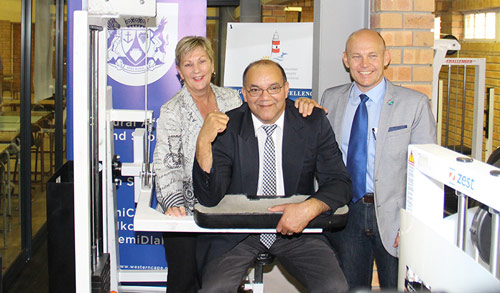
Western Cape Department of Cultural Affairs and Sport (DCAS), Chief Director of Sport, Dr Lyndon Bouah, said potential academy members would be referred via their respective sporting bodies.
“We work with the various federations, including netball, football, rugby and athletics. We facilitate scientific tests done by accredited service providers. They test, among other things, how far you run, your running speed, etc. After all of these scientific tests are done, we invite you to be part of the academy if you are good enough. As the athletes become better and stronger in their chosen code, they improve their chances of qualifying for the South African team.”
The upgrades at Glaskasteel included the installation of a projector and screen, a bathroom for differently-abled athletes and a gym. The walls of the facility were also strengthened and new floodlights worth R300 000 were installed on the rugby, soccer and cricket playing fields.
Glaskasteel is also the main sports facility used by the general public, meaning players who are part of affiliated sports teams and clubs will also benefit from the upgrades. The floodlights in particular have been a welcome addition because they allow teams to train safely after dark.
The Overberg District Academy is one of seven in the Western Cape.
“Sport is the only activity that really keeps our young people healthy and teaches them discipline and gives them a sense of belonging, said Anroux Marais, the Western Cape Minister of Cultural Affairs and Sport, at the opening
Government to abolish work experience for entry posts
Government to abolish work experience for entry posts JoyThe initiative will enhance government’s human resource development capacity, which will alleviate high levels of unemployment, especially among the youth.
From 1 April 2019, work experience will no longer be a requirement for recruitment for entry level jobs in the public sector, the Department of Public Service and Administration (DPSA) has announced.
This was part of government’s efforts to address the country’s high youth unemployment rate.
 The department is currently in the process of amending regulations in this regard that will take effect at the commencement of the 2019/20 financial year.
The department is currently in the process of amending regulations in this regard that will take effect at the commencement of the 2019/20 financial year.
DPSA Minister Ayanda Dlodlo has taken the initiative to review the current legislative framework in order to facilitate the implementation of this new dispensation.
The process will also see the removal of unnecessary barriers to entry into the public service and provision of a platform for new graduates to acquire the required experience in their career paths. Additionally, the initiative will see new and innovative blood attracted into the public service.
In a statement, Minister Dlodlo said the changes will not do away with the inherent requirements of professional fields.
“This exercise will be structured in such a way that it does not compromise the professional and technical requirements for various fields. All we want to do is streamline career paths and align skills, which will make the public service fit for purpose.”
DPSA spokesperson Mava Scott said the focus of recruitment will now be on minimum academic qualifications obtained from appropriately registered training institutions in terms of the National Qualifications Framework Act and the pre-employment verification, as specified in the Public Service Regulations of 2016.
Dlodlo has instructed the department to issue a circular to the public service mandating Heads of Departments in national and provincial spheres of government to ensure a state of readiness towards a phased implementation by 1 April 2019.
Paperless recuitment
Meanwhile, the department will introduce a paperless administration across the public service and an e- recruitment system.
“As government, we are concerned that we took long to evolve in this process, resulting in young people, who mostly are techno savvy, enduring the burden of incurring unnecessary costs when applying for positions in the public service. The world has moved on and the public service needs to keep up and embrace the digital age in all its processes,” said Dlodlo.
The Minister has instructed the department to introduce a digital Z83 application form as an additional platform for job seekers in the public service. Processes will be put in place to ensure compliance with the Public Service Act by formally introducing the digital Z83 form through notice in the Government Gazette. SAnews.gov.za
Hawks making inroads on high-profile cases
Hawks making inroads on high-profile cases JoyGovernment is doing everything in its power to crack down on fraud and corruption.
Detectives from the Directorate for Priority Crime Investigation are making inroads on several high profile police cases – from allegations of state capture and commercial crimes, to organised crime – with some probes successfully concluded, while others are awaiting verdicts from the courts.
 This is according to Hawks head Advocate Godfrey Lebeya, who recently briefed the Portfolio Committee on Police in the Old Assembly.
This is according to Hawks head Advocate Godfrey Lebeya, who recently briefed the Portfolio Committee on Police in the Old Assembly.
The report to the committee touched on cases that involve allegations of state capture levelled against the Gupta family, investigations into Bosasa contracts with the Department of Correctional Services and the VBS Mutual Bank looting.
This update included the successful clampdown on the recent spate of violent cash-in-transit robberies.
“Just as an overview, with regards to cash-in-transit robberies, since August 2017 to 22 November 2018, 284 arrests were effected, and 214 of these suspects remain in custody, the others – 31 – were released on bail and 52 convictions have been secured.
“A total of 161 firearms and 116 vehicles have been recovered,” Lebeya said.
Lebeya briefed Members of Parliament on 22 selected cases out of a case workload of 15 804 cases that were being investigated by less than 2 600 Hawks members.
High-profile cases that are still under investigation include the R1.5 billion VBS Mutual Bank matter, where several municipalities unlawfully made deposits into the bank against treasury regulations. In this case, 71 statements have been taken.
Lebeya said that more than 610 statements have been obtained in an investigation involving the Bosasa Group of Companies in a matter dating back to between 2004 and 2007.
This relates to tenders that were awarded by the Department of Correctional Services to companies within Bosasa after services were extended over a period of time amid allegations that officials from Correctional Services received gratification from Bosasa.
The total amount involved in the fraud, corruption and contravention of the Public Finance Management Act is R1.6 billion.
Lebeya said the Bosasa investigation has been completed.
He said either an indictment or an arrest would accompany the securing of the forensic report. SAnews.gov.za
Home-grown health
Home-grown health vuyelwanRegistered dietician Mpho Tshukudu believes that people’s weight issues will resolve themselves when they trust the wisdom of the ancestors, prepare their food slowly and eat it with people they love.
After many years of suffering from leaky gut syndrome and numerous food allergies, Tshukudu took a closer look at her Anglo-Euro centric diet.
“I realised that, like me, most of my clients were middle-class black South Africans and the first generation with lifestyle diseases. As we moved further away from our heritage and acculturated to the western and city lifestyle, including what we cooked and ate, we gained weight.”
She said many of her clients were being diagnosed with lifestyle diseases such as diabetes, high blood pressure and abdominal fat (mkhaba).
 “And then it hit me. If we are what we eat. If we ignore our familial taste presence, then we become someone else,” she said.
“And then it hit me. If we are what we eat. If we ignore our familial taste presence, then we become someone else,” she said.
Tshukudu learnt that African food is healthy and delicious and that the answers that we have been looking for to solve our health problems are right under our noses. “We have been eating foraged, organic, ancient, gluten-free, vegan, low GI, low GL, slow-cooked, seasonal, sustainable, grass-fed, hormone-free for generations,” she said.
Whilst studying functional medicines, she was inspired to write the book, Eat Ting, which identifies the root cause of diseases and uses specific nutritional compounds to treat or manage illness.
“The foods mostly spoken about were American, Chinese and European. I wanted to implement the strategies when treating my patients and decided to research healthy, nutritious foods from Southern Africa. I learnt a lot from older patients and families about traditional and indigenous foods and food systems and realised that African foods are healthy, low-GI, organic, free-range and gluten free and can be used to manage and maintain a healthy lifestyle,” she said.
Going back to your roots to eat healthily has various advantages, including that food is easily available and cost effective. “Food grows easily in rural areas because it is indigenous and is therefore used to the climate and soil composition,” said Tshukudu.
“The food that is around you is healthy and sometimes superior in taste and nutrition, compared to store-bought products that may be stripped of fibre, vitamins and minerals and filled with sugar, salt and unhealthy fats.”
Take control of your diet
Tshukudu explains that the reasons South Africans are becoming overweight and there is an increase in lifestyle diseases is because more people opt to eat takeaways and store-bought food. They exercise less and are not involved with food production and thus lose touch with the effort taken to prepare a meal.
“We associate foods from rural areas with poverty. But, because the ‘new’ foods are not our preferred taste and they lack nutrition, we tend to overeat in an effort to feel full,” she said. 
To take control of your diet and get back to nutrient-dense foods, Tshukudu has these tips for South Africans:
- Take control of what you eat
- Appreciate local foods
- Teach children about their food heritage and customs associated with the food
- Start a small garden to grow your own food.
“Home-grown food is fresher than store-bought items; home gardening uses less chemicals, such as pesticides; and gardening is therapeutic, a form of exercise that can help family members bond and encourages children to learn about where food comes from,” she said.
Lunchbox ideas
When adding items to your lunchbox, Tshukudu suggested that vegetables, especially traditional leaves (morogo), are more nutritious than spinach and they grow easily in rural areas. You can also add a fruit, especially indigenous and traditional ones such as mulberry and figs; and raw nuts, such as groundnuts, marula or cashews. You can also cook with nuts. For example, sorghum porridge; morogo cooked with nuts or peanut butter; and samp, beans and ground nuts with cabbage.
What is for dinner?
Tshukudu urges you to consider legumes (beans and lentils) because they make great stews in winter and can be added to salad or mixed with whole sorghum or corn (dikgobe). They can also be used to make burger patties and are a good source of plant protein, fibre and minerals.
She also recommends offal (intestines, hearts, gizzards, tripe and trotters), which is a nutritious protein source and is inexpensive; and the inclusion of potatoes, sweet potatoes, amadumbe, traditional squash and pumpkins to your diet.
“Do not add sugar to the sweet potato and squash and eat the skin when possible,” she said.
Jobs: Department of Justice and Constitutional Development - Dec 2018
Jobs: Department of Justice and Constitutional Development - Dec 2018 tsoanaDirector: Monitoring and Evaluation
Reference no: 18/211/DG (Pretoria)
Salary: R1 005 063 – R1 183 932 per annum (All inclusive remuneration package). The successful candidate will be required to sign a performance agreement.
Requirements: An undergraduate qualification (NQF level 7) as recognized by SAQA or equivalent qualification; 5 years’ experience at a middle/ senior managerial level of which 3 years in Strategic Planning or Monitoring and Evaluation; Knowledge of the regulatory framework of the Public Service, the Public Finance Management Act, the Public Service Regulations, National Treasury Regulations and other relevant prescripts; A valid driver’s license.
Enquiries: Ms. D. Modibane (012) 315 1668
Family Counsellor Manager
Reference no: 18/218/CS (PRETORIA)
Salary: R755 598 – R850 443 per annum (Salary will be in accordance with OSD determination). The successful candidate will be required to sign a performance agreement.
Requirements: Bachelor’s Degree in Social Work or equivalent qualification; A minimum of 10 years appropriate experience in social work after registration as social work with the SA Council for Social Service Professions (SACSSP); Experience in management field of Child Care and Protection or related environment will be an added advantage; Registration with SACSSP as a social worker; Knowledge and understanding of legislation and treaties relevant to domestic and international Child Protection, the PFMA and Treasury Regulations; Experience in statutory social work, compiling forensic reports and testifying as an expert witness in court will be an added advantages; Knowledge of integrated approach in provision of services to families and children in civil legal disputes in accordance with domestic law and international treaties as well as expert knowledge of Child Care and Protection services.
Enquiries: Ms M. Kganyago (012) 315 1844
Deputy Director (3 Year Contract Appointment)
Reference no: 18/208/CFO (Pretoria)
Salary: R697 011 – R821 052 per annum (All inclusive remuneration package). The successful candidate will be required to sign a performance agreement.
Requirements: A Bachelor’s Degree in Financial Management or equivalent qualification; A minimum of 5 year’s relevant experience in a financial environment, of which a minimum of 3 years must be at management level; Knowledge of the Public Finance Management Act (PFMA) and National Treasury Regulations; Knowledge of Supply Chain Management within the Public Sector.
Enquiries: Ms N. Joseph (012) 357 8646
Deputy Director: Senior Database Administrator
Reference no: 18/203/DG (Pretoria)
Salary: R697 011 – R821 052 per annum (All inclusive) The successful candidate will be required to sign a performance agreement.
Requirements: National Diploma or Bachelor’s Degree in Computer Science/Statistical or equivalent qualification; 3 years’ experience in a data base administration and Geographical Information Systems of which 3 years will be at Assistant Director/Management level; Knowledge of GIS Web Application Development and customization will be an added advantage.
Enquiries: Ms. M. Modibane (012) 315 1668
Office Manager
Reference no: 18/184/CLO (Pretoria)
Salary: R697 011 – R821 052 per annum (All Inclusive Remuneration Package).
Requirements: An appropriate National Diploma/ Degree in Public Administration or equivalent qualification; 3 years relevant experience of which one year should be at supervisory level; Knowledge of Performance Management System and Financial Management in the Public Service will be an added advantage; Knowledge of the Public Service environment; A valid driver’s license.
Enquiries: Ms K. Ngomani (012) 357 8661
Deputy Master MR-6 (02 Posts)
Reference no: 18/183/MAS: Cape Town
Reference no: 18/223/MAS: Polokwane
Salary: R448 269 – R1 084 437 per annum (Salary will be in accordance with OSD determination). The successful candidate will be required to sign a performance agreement.
Requirements: LLB degree or a four year recognized legal qualification; 8 years appropriate post qualification legal experience; Knowledge of the Administration of Estates, Mental Health, Insolvency Act, Companies, Close Corporations, Trust Property Control Acts and other relevant legislations; Experience in the functional fields of the services provided by the Masters of the High Court; A valid driver’s licence.
Enquries: Mr S. Maeko (012) 315 1996
Court Manager (02 Posts)
Reference no: 10/18/LMP (Groblesdal and Parktiseer Magistrate)
Salary: R444 693 – R523 818 per annum. The successful candidate will be required to sign a performance agreement.
Requirements: Three (3) year qualification in Administration and/ or National Diploma Service Management (NQF level 5) plus the module on Case Flow Management or relevant equivalent qualification; Three years managerial or supervisory experience; Knowledge of Public Financial Management Act (PFMA) and the Departmental Financial Instruction (DFI) and Departmental policies and procedures; Understanding of the Department’s accounting systems (JDAS, ICMS, JYP); A valid driver’s license.
Enquries: Ms Mongalo MP. (015) 287 2172 or Mr Maakamedi TP. (015) 287 2026
Office Manager
Reference no: 18/221/MAS (Polokwane)
Salary: R356 289 – R419 679 per annum. The successful candidate will be required to sign a performance agreement.
Requirements: Bachelor’s Degree/National Diploma in Office Administration or equivalent qualification; At least 3 years’ experience in Administration environment; Knowledge of finance and procurement directives and procedures; Knowledge of all legislation and policies that inform the Department’s administrative support activities; Knowledge of the core functions of the Masters Office; A valid driver’s license.
Enquries: Mr. M. Maeko Tel (012) 315 1996
Assistant Director: Internal Control (3 Year contract Appointment)
Reference no:18/206/CFO (Pretoria)
Salary: R356 289 + 37% = R488 115 in lieu of benefits. The successful candidate will be required to sign a performance agreement.
Requirements: 3 years Degree/ National Diploma in Financial Accounting/ Financial Management or equivalent qualification at NQF6; A minimum of 3 years relevant experience in the field of Finance which must include Internal Control experience as a State Accountant; Knowledge of Financial Provisioning and/ or Administration procedures and processes; Knowledge of the Public Finance Management Act (PFMA), Treasury Regulations and other legislative prescripts; A valid driver’s licence.
Enquries: Ms. N. Joseph (012) 357 8646
Social Worker/Family Counsellor Grade 1 (2 Posts)
Reference no: 2018/80/GP (Johannesburg)
Salary: R242 553.00 – R281 181.00 per annum. (Salary will be in accordance with the OSD determination). The successful candidate will be required to sign a performance agreement.
Requirements: Bachelor Degree in Social Work or equivalent qualification which allows for professional registration with the SA Council for Social Service Professions (SACSSP); proof of registration with SACSSP, Appropriate experience in social work after registration with SACSSP; Knowledge and experience in Mediation; Court Experience in rendering expect Evidence; Knowledge and application of Family Law, including Mediation in certain Divorce Matters Act, Children’s Act, Maintenance Act and Domestic Violence Act (inclusive of Hague Convention on International Child Abduction); A valid drivers’ license.
Enquries: Ms. R. Moabelo (011) 332 9000
Social Worker/Family Counsellor Grade 1- 3
Reference no:18/73/KZN: (Durban)
Salary: R242 553.00 - R421 404 (Salary will be in accordance with the OSD determination). The successful candidate will be required to sign a performance agreement.
Requirements: Bachelor’s Degree in Social Work or equivalent qualification which allows for professional registration with the SA Council for Social Service Professions (SACSSP); proof of registration with SACSSP, Appropriate experience in social work after registration with SACSSP; Knowledge and experience in Mediation; Court experience in rendering expect evidence; Knowledge and application of Family Law, including Mediation in certain Divorce Matters Act, Children’s Act ; Maintenance Act and Domestic Violence Act (inclusive of Hague Convention on International Child Abduction); A valid driver’s license; Language proficiency in Afrikaans will be an added advantage
Enquries: Mr J.N. Mdaka (031) 372 3000
Estate Controller EC 1
Reference no:18/204/MAS
Salary:R186 828 per annum. (Salary will be in accordance with OSD determination). The successful candidate will be required to sign a performance agreement.
Requirements: An LLB degree or recognized four years legal qualification.
Enquries: Mr. M. Lehong (012) 315 1264
Maintenance Officer (MR-1 – MR-3)
Reference no: 30/18/NC: (Will Namaqua Magistrial District)
Salary: R 186 828.00 – R 276 780.00 per annum. (Salary will be in accordance with OSD determination) The successful candidate will be required to sign a performance agreement.
Requirements: LLB or an appropriate four year recognized legal qualification; Extensive knowledge of the maintenance system; Proficiency in at least two official languages; Understanding of all services and procedures in the area of maintenance and other areas of family law; A valid driver’s license.
Enquries: Mr J Tope (053) 802 1300
Closing date: 24 December 2018
Note: Interested applicants may visit the following website: www. justice.gov.za or www.dpsa.gov.za to view the full job specification of the above positions. Applications must be submitted on Form Z83, obtainable from any Public Service Department or on the internet at www.gov.za. A Z83 form & CV must be accompanied by original certified copies of qualifications, identity document and a driver’s license where necessary. A SAQA evaluation report must accompany foreign qualifications. Applications that do not comply with the above mentioned requirements will not be considered. All shortlisted candidates for SMS posts will be subjected to a technical and competency assessment. Candidate will complete a financial disclosure form and also be required to undergo a security clearance. The foreigners or dual citizenship holder must provide the Police Clearance certificate from country of origin.
The DOJ&CD is an equal opportunity employer. In the filling of vacant posts the objectives of section 195 (1) (i) of the Constitution of South Africa, 1996 (Act No: 108 of 1996), the Employment Equity imperatives as defined by the Employment Equity Act, 1998 (Act No: 55 of 1998) and relevant Human Resources policies of the Department will be taken into consideration. Reasonable accommodation shall be applied for People with Disabilities including where driver’s license is a requirement. Correspondence will be limited to short-listed candidates only. If you do not hear from us within 3 months of this advertisement, please accept that your application has been unsuccessful. The department reserves the right not to fill these positions. Women and people with disabilities are encouraged to apply and preference will be given to the EE Target.
Tel: 012 315 1111 Private Bag X81, Pretoria, 0001 Momentum Centre, 329 Pretorius Street, Pretoria
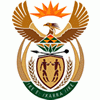
Jobs: Department of Labour - Dec 2018
Jobs: Department of Labour - Dec 2018 tsoanaPsychometrist / Registered Counsellor
Centre: Labour Centre: De Aar
Reference no: HR4/4/8/354
Salary: Commencing:Grade 1 (R 547 917.00 - R 608 103.00) (OSD) 0(zero) experience;
Commencing: Grade 2 (R 626 481.00 - R 695 295.00) (OSD) 8 years relevant experience;
Commencing: Grade 3 (R 712 950 .00 - R 791 253.00) (OSD) 16 years relevant experience.
Enquiries: Mr. A Senakhomo, Tel: (053) 838 1545
Provincial Office: Chief Director: Provincial Operations, Private Bag X 5012, Kimberley, 8301
Deputy Director: Financial Planning
Centre: Chief Directorate: Financial Management, Head Office
Reference no: HR 4/18/12/91 HO
Salary: All inclusive: R 697 011 per annum
Enquiries: Mr. D Kyle, Tel: (012) 309 4298
Head Office: Chief Director: Human Resources Management: Private Bag X 117, Pretoria 0001
Closing date: 4 January 2019
For full details of the advertised posts visit our website: www.labour.gov.za
Applications must be submitted on form Z83, obtainable from any Public Service Department or on the internet at www.gov.za/documents. The fully completed and signed form Z83 should be accompanied by a recently updated, comprehensive CV as well as recently certified copies of all qualification(s) including a Senior Certificate and ID-document [Driver’s license where applicable]. Non-RSA Citizens/Permanent Resident Permit Holders must attach a copy of their Permanent Residence Permits to their applications. Should you be in possession of a foreign qualification, it must be accompanied by an evaluation certificate from the South African Qualification Authority (SAQA). Applicants who do not comply with the above-mentioned requirements, as well as applications received late, will not be considered. The Department does not accept applications via fax or email. Failure to submit all the requested documents will result in the application not being considered. Correspondence will be limited to short-listed candidates only. If you have not been contacted within eight (8) weeks after the closing date of this advertisement, please accept that your application was unsuccessful. Suitable candidates will be subjected to a personnel suitability check (criminal record, citizenship, credit record checks, qualification verification and employment verification). Where applicable, candidates will be subjected to a skills/knowledge test. All shortlisted candidates for SMS posts will be subjected to a technical competency exercise that intends to test relevant technical elements of the job, the logistics of which be communicated by the Department. Following the interview and technical exercise, the selection panel will recommend candidates to attend generic managerial competencies using the mandated DPSA SMS competency assessment tools. Successful candidates will be appointed on a probation period of 12 months. The Department reserves the right not to make any appointment(s) to the above post. The successful candidate will be expected to sign a performance agreement. The Department of Labour is an equal opportunity affirmative action employer. The employment decision shall be informed by the Employment Equity Plan of the Department. It is the Department’s intention to promote equity (race, gender and disability) through the filling of this post(s) with a candidate whose transfer / promotion / appointment will promote representativity in line with the numerical targets as contained in our Employment Equity Plan.

Jobs: Department of Labour - Jan 2019
Jobs: Department of Labour - Jan 2019 UrsulaChief Director: Provincial Operations
Centre: Provincial Office: Eastern Cape
Reference No: HR 4/19/02/12HO
Salary: All inclusive: R 1 189 338 per annum
Enquiries: Ms. M Bronkhorst, Tel: (012) 309 4969
Head office: Chief Director: Human Resources Management: Private Bag X 117, Pretoria, 0001
Principal COID: Employer Auditor (2 posts)
Centre: Provincial Office: East London-
Reference No: HR 4/4/1/170(1 post)
Provincial Office: Mmabatho- Reference No: HR4/4/9/54(1 post)
Reference No: HR 4/19/02/12HO
Salary: Commencing: R444 693 per annum
Enquiries: Adv. LD Mkhonto Tel: 043 701 3279/3287 or ABM Mampuru, Tel: (018) 387 8100
Provincial office: Chief Director: Provincial Operations, Private Bag X 9005, East London, 5200 or Chief Director: Provincial Operations: Private Bag X 2040, Mmabatho, 2735
Assistant Director: Statutory Services
Centre: Provincial Office: Gauteng
Reference No: HR 4/4/4/08/08
Salary: Commencing: R 356 289 per annum
Enquiries: Adv. M Msiza, Tel: (012) 309 4027
Provincial office: Chief Director: Provincial Operations: PO Box 4560, Johannesburg, 2001
Assistant Director: Risk Management
Centre: Directorate: Risk Management, Head Office
Reference No: HR 4/19/02/13HO
Salary: Commencing: R 356 289 per annum
Enquiries: Ms G Baker, Tel: (012) 309 4968
Head office: Chief Director: Human Resources Management: Private Bag X 117, Pretoria, 0001
Deputy Director: HRD and Performance Management
Centre: Provincial Office: Gauteng
Reference No: HR 4/4/4/10/09
Salary: All inclusive: R 697 011 per annum
Enquiries: Ms. K J Ntshingane, Tel: (011) 853 0300
Provincial office: Chief Director: Provincial Operations: PO Box 4560, Johannesburg, 2001
Principal Inspector: Employer Audit
Centre: Provincial Office: KwaZulu-Natal
Reference No: HR 4/4/5/04
Salary: Commencing: R444 693 per annum
Enquiries: Mr. EM Khambula, Tel: (031) 366 2203
Provincial office
Chief Director: Provincial Operations: PO Box 940, Durban, 4000
Assistant Director: Labour Market Information Statistics
Centre: Provincial Office: Limpopo
Reference No: HR 4/4/6/23
Salary: Commencing: R444 693 per annum
Enquiries: Ms. TE Maluleke, Tel: (015) 290 1662
Provincial office: Chief Director: Provincial Operations, Private Bag X 9368, Polokwane, 0700
Counsellor (2 posts)
Centre: Labour Centre: Pinetown- Reference No: HR 4/4/5/102(1 post)
Labour Centre: Mdantsane – Ref No: HR 4/4/1/198 (1 post)
Salary: Commencing: Grade 1 (R547 917.00 – R 608 103.00) (OSD) 0 (zero) experience, Commencing: Grade 2 (R626 481.00 – R 695 295.00) (OSD) 8 years relevant
experience Commencing: Grade 3 (R712 950.00 – R 791 253.00) (OSD) 16 years relevant experience
Enquiries: Mr. EB Zondi, Tel: (031) 701 7740 or Mr. XT Madikane, Tel: (043) 7613151
Provincial office: Chief Director: Provincial Operations: PO Box 940, Durban, 4000 or Chief Director Provincial Operations: Private Bag X 9005, East London, 5200
Assistant Director: COIDA
Centre: Labour Centre: Mthatha
Reference No: HR4/4/1/12)
Salary: Commencing: R444 693 per annum
Enquiries: Mr. S Mapukata, Tel: (047) 501 5600
Provincial office: Chief Director: Provincial Operations: Private Bag X 9005, East London, 5201
Assistant Director: COID-Statutory Services
Centre: Provincial Office: Gauteng
Reference No: HR 4/4/4/01/02
Salary: Commencing: R 356 289 per annum
Enquiries: Adv. M Msiza, Tel: (012) 309 4027
Provincial office: Chief Director: Provincial Operations: Private Bag X 4560, Johannesburg, 2001
Closing date for applications: 19 February 2019
For full details of the advertised posts visit our website: www.labour.gov.za
Applications must be submitted on form Z83, obtainable from any Public Service Department or on the internet at www.gov.za/documents. The fully completed and signed form Z83 should be accompanied by a recently updated, comprehensive CV as well as recently certified copies of all qualification(s) including a Senior Certificate and ID-document [Driver’s license where applicable]. Non-RSA Citizens/Permanent Resident Permit Holders must attach a copy of their Permanent Residence Permits to their applications. Should you be in possession of a foreign qualification, it must be accompanied by an evaluation certificate from the South African Qualification Authority (SAQA). Applicants who do not comply with the above-mentioned requirements, as well as applications received late, will not be considered. The Department does not accept applications via fax or email. Failure to submit all the requested documents will result in the application not being considered. Correspondence will be limited to short-listed candidates only. If you have not been contacted within eight (8) weeks after the closing date of this advertisement, please accept that your application was unsuccessful. Suitable candidates will be subjected to a personnel suitability check (criminal record, citizenship, credit record checks, qualification verification and employment verification). Where applicable, candidates will be subjected to a skills/knowledge test. All shortlisted candidates for SMS posts will be subjected to a technical competency exercise that intends to test relevant technical elements of the job, the logistics of which be communicated by the Department. Following the interview and technical exercise, the selection panel will recommend candidates to attend generic managerial competencies using the mandated DPSA SMS competency assessment tools. Successful candidates will be appointed on a probation period of 12 months. The Department reserves the right not to make any appointment(s) to the above post. The successful candidate will be expected to sign a performance agreement. The Department of Labour is an equal opportunity affirmative action employer. The employment decision shall be informed by the Employment Equity Plan of the Department. It is the Department’s intention to promote equity (race, gender and disability) through the filling of this post(s) with a candidate whose transfer / promotion / appointment will promote representativity in line with the numerical targets as contained in our Employment Equity Plan.

Last chance to register!
Last chance to register! vuyelwanElections 2019
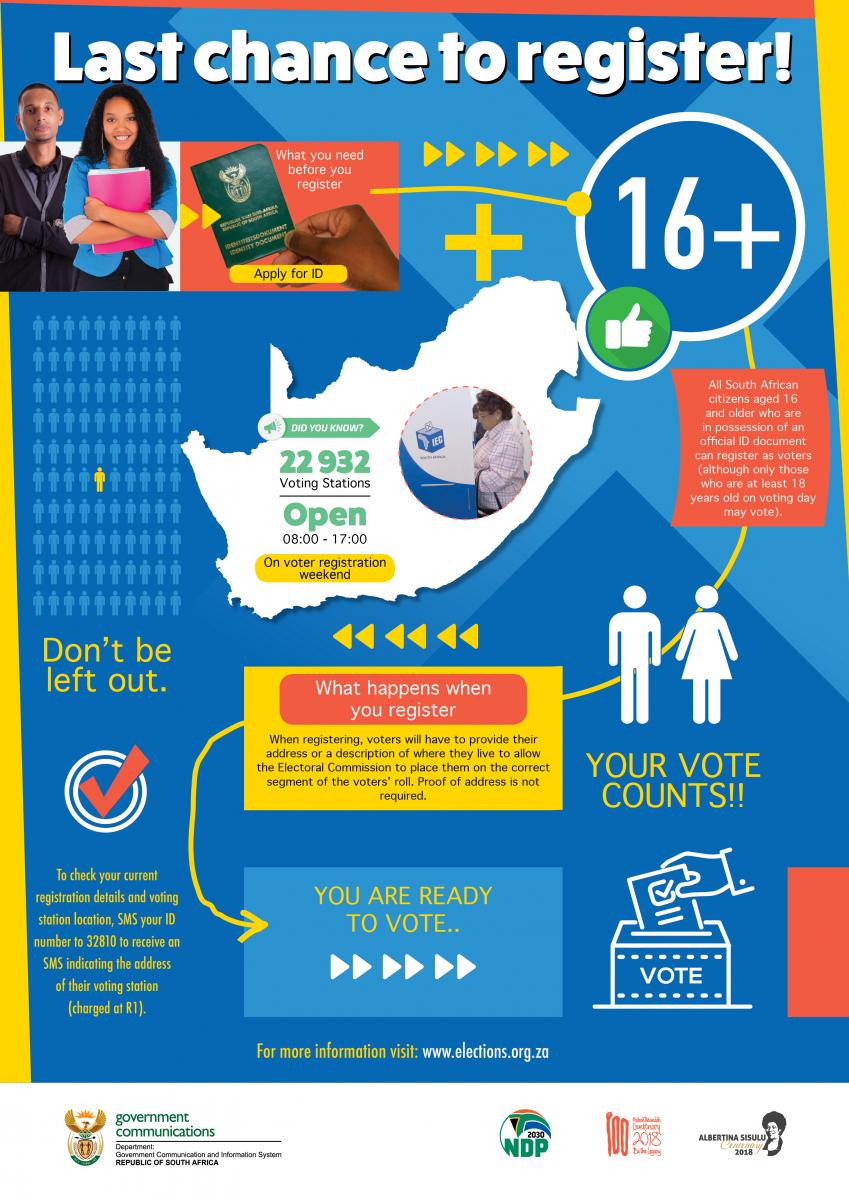
Let’s make a fresh start
Let’s make a fresh start vuyelwanUnion Buildings
Everyone is inspired by a new year. Our batteries have been recharged over the festive season – and it’s now time to start afresh; to push forward and do better than we did last year.
I hope you are well rested, ready to roll up your sleeves and play your part in moving South Africa forward in your own big ways and small, wherever you are in the country.
This year, 2019, is an exciting year for us as a country because it is the year that we all get to exercise our hard-earned right to make our voices heard by choosing the party that will lead our nation and that will improve the lives of our people and take our nation forward.
This will happen during the sixth general election in May.
Importantly, the election will follow our celebration – in Freedom Month, April – of 25 years of freedom and democracy in a country that is vastly different, and better so, from the South Africa we were back in 1994.
By casting your vote, you will not only strengthen the country’s democracy, but also become active citizens by electing leaders of your choice who will help improve the quality of life of our people.
But, before we heed this call and make our way to the voting stations to vote, we need to register to vote.
The last voter registration weekend is set to take place on Saturday, 26 and Sunday, 27 January.
The Independent Electoral Commission (IEC) will have 22 932 voting stations which will open from 08:00 to 17:00. This makes it possible for you to take the first step of exercising your right to vote, by registering to vote.
During that weekend, new voters will receive an opportunity to register and existing voters can update and check their registration details.
There are currently 26.1 million registered voters on the national common voters’ roll. The IEC hopes to add at least one million new voters to the voters’ roll for the 2019 elections.
We must help the IEC achieve this goal. I call on all young people who are 18 years and older to get involved in building our country. One way to do this is to register to vote and come May 2019, go and make your mark on the ballot paper. The future of our country is in the hands of our young people. Take a stand.
The right to vote must never be taken for granted. Many people lost their lives and made enormous sacrifices in order for us to live freely and have a say in who leads our nation.
Elections that are regular, free, fair and vibrant are integral to our maturing as a nation and a democracy.
We must remember that elections are not primarily about the fortunes of parties.
Elections are, first and foremost, about improving the lives of South Africans. It allows voters and those seeking election to make informed political decisions.
We must use our vote to reinforce the right of all parties and candidates to campaign freely in all constituencies.
We must use our vote to encourage more South Africans to become politically active and play their role as active citizens.
In this year that we commemorate 25 years of democracy, let us use this process to reinforce democracy.
After centuries of conflict, we are now able to settle our differences at the ballot box.
We call on all those who have something to say, to register to vote.
We call on all those who reject racism, sexism and all forms of discrimination, to register to vote.
We call on those who want better streets, better public transport, better municipal services and better community infrastructure, to register to vote.
We call on all those who seek a better life for all, to register to vote.
It is up to all of us to take this country forward. It is in our hands.
I want to wish you all a happy, prosperous and fruitful 2019!
Marula makes Portia M marvel in business
Marula makes Portia M marvel in business JoyThrough a combination of financial and non-financial support from government, Mngomezulu’s business is moving faster and becoming more profitable.
 For many, leaving a secure job to venture into the unknown world of business, is a scary thought. But businesswoman Portia Mngomezulu, chose to put her faith in her dreams.
For many, leaving a secure job to venture into the unknown world of business, is a scary thought. But businesswoman Portia Mngomezulu, chose to put her faith in her dreams.
She took the plunge and resigned from her job in IT to focus on her skincare and cosmetics company.
As daunting as the experience was for Mngomezulu, she instinctively knew she had made the right decision when she received a call from Massmart offering her a scholarship to study at the Gordon Institute of Business Science.
In 2014, the entrepreneur enrolled at the institution for a one-year supply development programme.
“I resigned in 2013 because my business was taking too much of my time. Even though I had some people laughing at me for leaving my job, I didn’t care because I already knew that one day I would have a full range of products,” Mngomezulu said.
The 37-year-old established her business “Portia M” in 2011 after she discovered that marula oil could reduce the appearance of stretch marks.
It was her mother in-law who suggested that she use marula oil when she had stretch marks after giving birth to her son.
Impressed by the results, she then began selling raw marula oil as a side business to her friends on Facebook and at church.
Today her products are available at Pick n Pay, Shoprite, Game and Clicks, as well as stores in Botswana and Lesotho, Namibia and Swaziland.
She developed a few products for her skincare range and when she was satisfied with them, she approached the Small Enterprise Development Agency (Seda) for assistance.
Seda paid for her products to be tested by the South African Bureau of Standards and provided her with a business adviser to guide her on her journey as a businesswoman.
Government institutions have played a major role in assisting Mngomezulu with financial support and navigating the business environment.
Last year Mngomezulu’s business received a R600 000 grant through Seda’s technology programme which she used to buy machinery.
 She is also a recipient of the Top 40 National Gazelles, a flagship small and medium-sized enterprises (SME) support programme of Seda and the Department of Small Business Development.
She is also a recipient of the Top 40 National Gazelles, a flagship small and medium-sized enterprises (SME) support programme of Seda and the Department of Small Business Development.
The programme is aimed at identifying and supporting SMEs with growth potential through a comprehensive range of business growth-oriented programmes, activities and partnerships.
As a recipient of the National Gazelles, Mngomezulu received a grant of R1 million in 2017.
Mngomezulu has lauded government for contributing to the growth of her business.
Mngomezulu, who employs about 30 people, advises aspiring entrepreneurs to develop their negotiating skills, deliver on time and invest the money they make back into their business. SAnews.gov.za
Meet the Eastern Cape’s leading ECD practitioner
Meet the Eastern Cape’s leading ECD practitioner JoyVuyokazi Wewe scooped the title of best Early Childhood Development (ECD) Practitioner in the Eastern Cape.
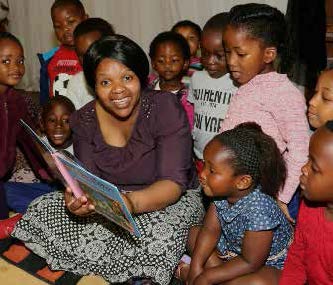 Wewe (31) received this award from the National Development Agency (NDA) in a ceremony held in Komani (formerly known as Queenstown).
Wewe (31) received this award from the National Development Agency (NDA) in a ceremony held in Komani (formerly known as Queenstown).
The NDA, an agency of the Department of Social Development, hosts this event annually to recognise and award excellence, innovation, best practice, dedication and participation in the ECD sector.
“I am happy to have won. This shows that we are being acknowledged as ECD practitioners, which is a sector that is often ignored. It is encouraging to see organisations like the NDA taking an interest in us,” said Wewe.
Wewe is an ECD practitioner at Noluthando Pre-School in Zwide township situated within the Nelson Mandela Bay Municipality.
She views her work as giving back to the community.
Wewe stood out from her peers due to her passion for early childhood education.
“I believe that my passion for developing the community makes me stand out as an ECD practitioner. I go out to the community and engage with parents and try to make them see the importance of ECD.”
Wewe said she is concerned about the large number of children in the Zwide township who were not attending pre-school.
“Before children go to school they need to go through early childhood development. I try to stress to parents the importance of this in developing the children. ECDs provide transition between home and school and we prepare them socially and emotionally,” she said.
She added that ECDs prepare children for primary school and protects them from social ills and accidents.
“We prepare them to express themselves and correct their speech and pronunciation. The social skills they learn at ECD centres last them a lifetime.”
The Department of Social Development supports ECDs with R15 per day per child as non-profit organisation services.
Stakeholders such as NDA provide courses, workshops and training on governance and school governing body training. They also raise awareness of special needs children.
“If young people are interested in becoming an ECD practitioner, training is available at TVET colleges and other private tertiary institutions.”
Wewe will represent the Eastern Cape during the national leg of the competition scheduled to take place next month in Mpumalanga.
NSFAS ready to fund students in 2019
NSFAS ready to fund students in 2019 vuyelwanThe National Student Financial Aid Scheme (NSFAS) received over 400 0000 applications for 2019.
Higher Education and Training Minister Naledi Pandor says the National Student Financial Aid Scheme (NSFAS) is ready to fund qualifying students for the 2019 academic year.
Minister Pandor made the announcement during a media briefing held in Cape Town recently.
In 2018, NSFAS disbursed loans and bursaries to the tune of R22 billion for 659 000 beneficiaries which included 371 368 university students and 288 341 TVET colleges.
“This amount is expected to increase [in 2019] to approximately R32 billion, which is estimated to fund about 400 920 TVET colleges students and 377 050 University students,” said Minister Pandor. 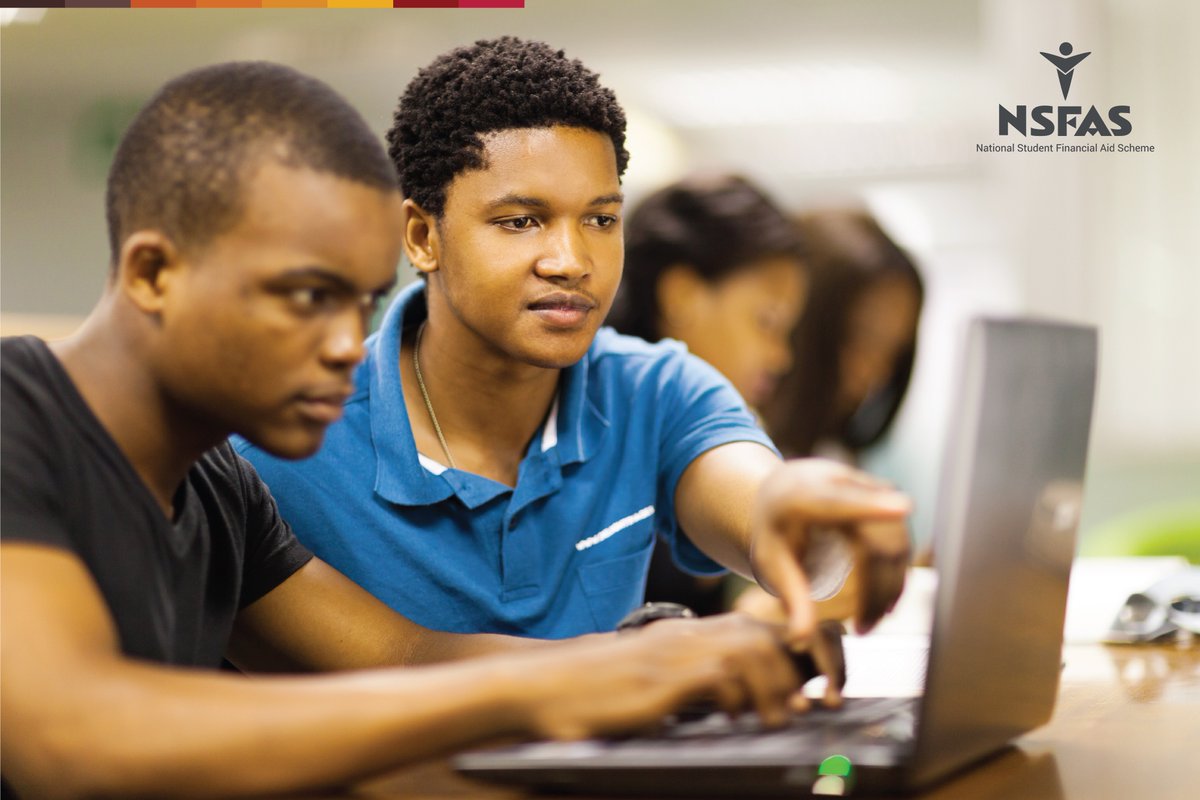
She said NSFAS will communicate to students who meet the financial eligibility criteria and have received an academic offer via SMS and email at the beginning of this month. This will be done once academic results have been made available to NSFAS.
Pandor said the scheme was in the process of evaluating all applications received. The evaluations process checks whether applicants are eligible for funding by verifying all data received by students with third parties like the SA Revenue Service and Home Affairs.
“To qualify for funding a student must meet the financial eligibility criteria and register at an institution for an approved programme. Successful students will receive bursary funding to cover their tuition fee for their registered programme and an allowance for learning materials. They may also qualify for subsidised accommodation and transport allowances where applicable,” she said.
She said funding is only confirmed once a student has met the financial eligibility criteria and is formally registered at a public TVET college or university for an approved funded programme.
Smooth application process
Pandor added that the 2019 application cycle has proceeded relatively smoothly with more than 400 000 applications received between the opening of applications on the 3 September and the closing of applications on the 3 December 2018.
She said on average, NSFAS received more than 3 200 applications a day over the period from September to December, with the number reaching as high as 30 000 on one of the days.
Out of all the applications, 63 percent were females while males made up 37 percent of the applications.
A total of 34 413 applications were received from social grant beneficiaries. Students who are beneficiaries of the South Africa Social Security Agency (SASSA) grant, automatically qualify in terms of the financial qualification criteria and will be funded if admitted and registered at a TVET college or university.
“However, it is a concern that only 24 percent of the applications are from learners who wish to enrol at TVET colleges, with the balance of 88 percent being applications for universities,” the Minister said.
Pandor said of all the applications, the highest number, 95 523, was received from the KwaZulu-Natal province. The number represents 45 percent of the total number of learners that wrote their National Senior Certificate in the province, while the lowest number was from the Northern Cape with 2 573 applications.
She said the success of the current application process can be attributed to a number of factors – including the revised and easy-to-complete online application system, which allowed applicants to complete an application within five minutes; the simplicity of the on-line and manual form with fewer fields to fill; and the accessibility of NSFAS where applicants have been able to apply at the National Youth Development Agency (NYDA) as a result of the scheme’s long-standing partnership with the agency. SAnews.gov.za
Passion for tourism leads to business success
Passion for tourism leads to business success JoyFrom a simple life on a farm in the rural Northern Cape Noncedo Seekoie (36) has grown into the top woman business owner in the province.
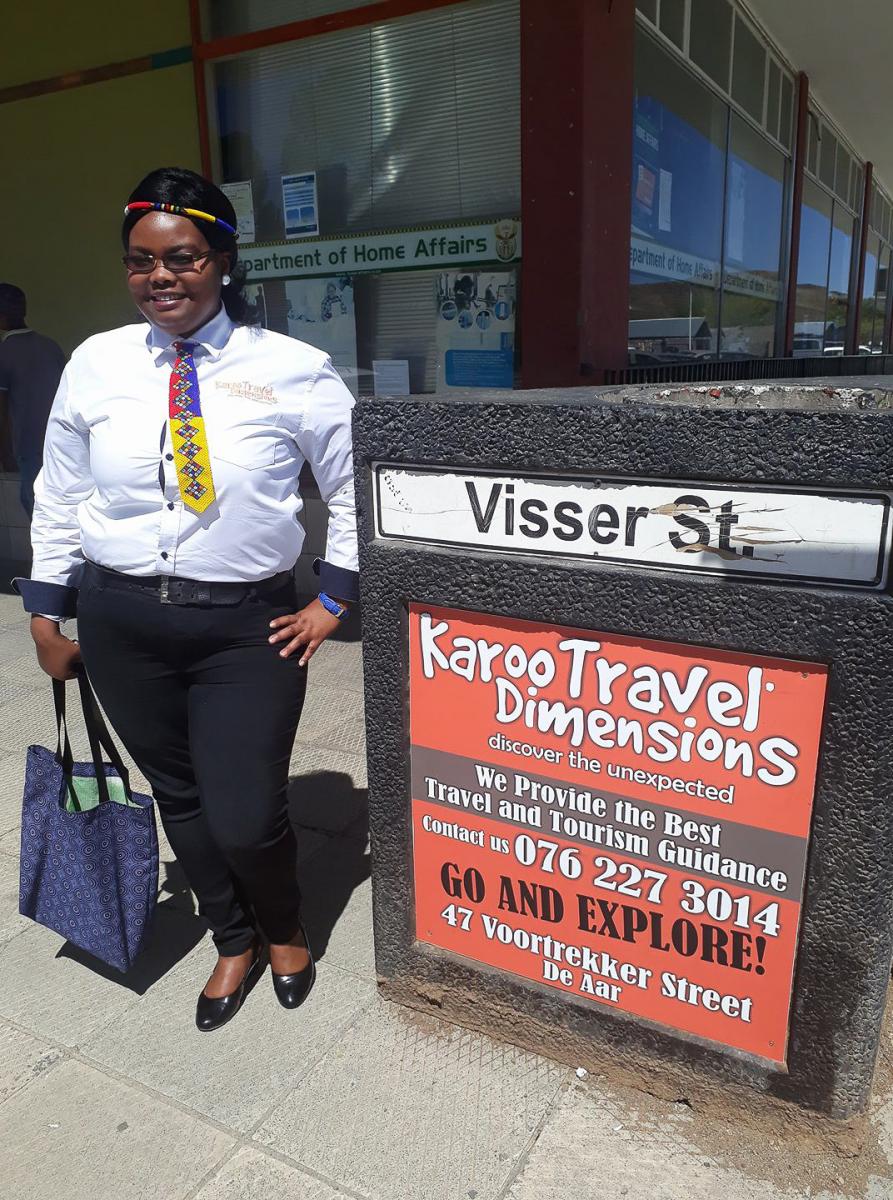 Seekoie was crowned Northern Cape Business Woman of the Year at the Mme Re Ka Thusa Trust Fund’s Rock-Solid Conference held recently in Kimberley.
Seekoie was crowned Northern Cape Business Woman of the Year at the Mme Re Ka Thusa Trust Fund’s Rock-Solid Conference held recently in Kimberley.
She walked away with R70 000.
Only established in 2016, her business Karoo Travel Dimensions has grown quickly. With some assistance from government and private funders, she has expanded from offering only horsecart tours, to offering adventure tours, city tours, historical tours and special interest tours.
She already employs two full-time workers, as well as two interns.
Seekoie grew up in poor circumstances on a farm outside Colesberg, where her mother was a domestic worker and her father a construction worker. After school, she studied tourism management at Walter Sisulu University in East London.
“Tourism has always been my passion, so I started my business in 2009. But then I won the New Venture Competition from the Department of Economic Development and Tourism, and got a job in the tourism office of the Emthanjeni Local Municipality until 2015. Then in 2016 I decided that I wanted to follow my passion of running my own tourism business,” says Seekoie.
She managed to secure funding and bought herself a nine-seater horsecart and office furniture to start her business.
“I am happy at how we have grown. We are now planning to open two new offices. Government has also helped a lot by opening the doors into the tourism industry and today some of the municipalities even use some of my services,” she says.
Seekoie is the perfect example of a passionate, hard-working woman. She manages bookings of flights and car rentals, does guest house grading and helps to design and implement tourism strategies in municipalities. She was also recently registered with the Sector Education and Training Authority (SETA) to become a tourism facilitator, so that she can further contribute to the industry.
“With tourism, you cannot be relaxed. The tourism industry is quite seasonal, so I work hard to make sure that I continue growing myself.”
Seekoie says that people who want to become business owners should follow their passion to become successful.
“You need to be passionate about the sector that you want to go into, and keep on educating yourself about the industry.”
Rural horse racing gallops ahead
Rural horse racing gallops ahead tsoanaA rural youngster is showing that they have what it takes to be a great jockey and events like the recently held Harry Gwala Summer Cup gives them a wonderful platform to compete against other rural riders.
He is only 25, but Mzamo Plaza Mtshali is already making his mark as a rural jockey.
Vryheid’s Mtshali is no stranger to winning; he has won a number of races, including the 2016 Dundee July, the Dumbe Municipality horse riding competition and the Scottville rural race.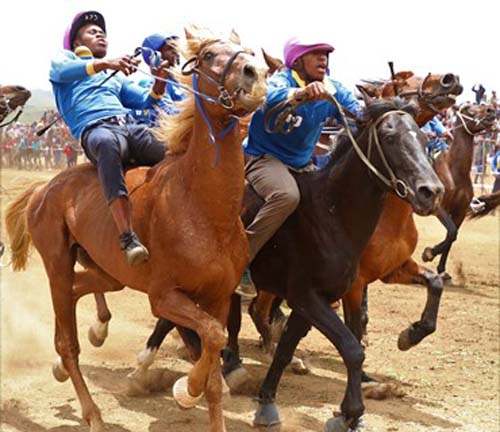
Mtshali also won the Harry Gwala Summer Cup Rural Horse Riding Festival in 2016, and repeated this victory this year by winning the Grade One Local Horses Category of the Cup.
KwaZulu-Natal MEC for Arts, Culture, Sport and Recreation, Bongi Sithole-Moloi was excited by the growing standard of the competition. “After the success of the Dundee July early this year, we were excited to see the standard of the Harry Gwala Summer Cup improving tremendously.
“People should start realising that horses are not only for riding when you want to go the shops, but one can actually create a source of income through horse riding. This is a growing annual event and we want to encourage local citizens to take advantage of available opportunities,” said MEC Sithole-Moloi.
Mtshali started riding at five and when he was 10, he was already racing professionally. After consolidating his reputation, he is now geared to train young jockeys. “I want to train young riders between the ages of seven and 14 so that they learn the skills I wish I had when I was starting out,” said Mtshali.
Mtshali said to be a good jockey, you first need to love the animal and study its behaviour.
“Horses are like humans. They need to be taken care of. They need to be given adequate and appropriate feed, water, shelter and quality health care. They also want to be given time to rest before a competition to regain their strength,” he said.
Although Mtshali’s career is jockeying nicely into place, he is preparing to go back to school to finish his Grade 12. He wants to be a veterinarian to help ensure that race horses are in tip-top shape.
SA’s borders are ready for the festive season
SA’s borders are ready for the festive season LondekileWhile the authorities have been hard at work ensuring that the country’s border posts are ready for the holiday season, travellers can help ensure that their border experience is as painless as possible by understanding what documents they need to have ready.
As South Africa prepares for another bustling festive season – with an influx of people into and out of the country - those responsible for border posts and points of entry have been hard at work to ensure that travellers have as pleasant an experience as possible.
Border checkpoints are essential for keeping undesirable people and goods from entering South Africa, and to control who and what leaves the country. They also have a huge role to play in the prevention of human trafficking, which has become a global challenge.
Ensuring that these core functions are properly executed in the face of a massive increase in travellers takes careful planning.
Home Affairs, the South African Police Service, the South African Revenue Service, the departments of health and agriculture and relevant stakeholders from neighbouring countries have developed a comprehensive operational plan in preparation for the rush.
Steps taken include extended hours at the busiest ports of entry; the deployment of 425 additional staff at the busiest ports; and ensuring that all IT equipment is in good condition at all ports of entry, to ensure optimal functioning and the setting up of overflow areas to assist with the large number of people expected to pass through Maseru Bridge, Lebombo and Beit Bridge borders.
Last year, there was just over 8.4 million arrivals and departures at South Africa’s ports of entry and 6.1 million of these were foreigners.
The top 10 ports for all movements were OR Tambo International Airport (1 569 100), Beit Bridge (1 215 845), Lebombo (936 415), Ficksburg (701 588), Maseru Bridge (699 186), Cape Town International Airport (555 451), Oshoek (384 076), Kopfontein (236 561), Ramathlabama (176 348) and Groblers Bridge (165 903).
Despite these staggering figures, border management authorities are geared up to detect risks such as fraudulent documents, undocumented travellers and poor access control due to congested roads.
“If you will be crossing one of our borders, please ensure that you know your responsibilities in terms of the documents you need,” said Home Affairs media liaison officer Thabo Mokgola.
There are different requirements for crossing into different countries. Some need health certificates, others need bank documents.
Mokgola said that to prevent unnecessary delays, travellers should find out which of the following they will need when crossing a border:
- Passports,
- Visas,
- Health certificates (where vaccinations may be needed),
- Permits for specified goods, plants or animals,
- Vehicle’s insurance and bank-authorised cross-border documents for vehicles, and
- Passports and birth certificates for children. Home Affairs has started issuing child passports, with parents’ details, which means that parents will no longer be required to produce unabridged birth certificates when in possession of these new passports.
Extended hours:
Mpumalanga’s Lebombo and Oshoek border posts, and the Free State’s Van Rooyenshek and Caledonspoort posts will be open for 24 hours during certain periods in December. The opening times of other ports will be extended by between one and two hours.
Turning toilets into water-saving devices
Turning toilets into water-saving devices LondekileBack in 2016, Rori Mpete and Thoriso Thobejane realised that precious drinking water was literally being flushed down the toilet. Millions of litres of clean, potable water is wasted when people use it to flush their toilets.
The two young men from Tshwane in Gauteng started a company called TnM Innovations, now known as Loo Afrique, after a funny incident in a bathroom.
Mpete, tired of broken basins in public ablution facilities which prevented him from washing his hands, one day decided to use the fresh water in the cistern to get the job done.
“I told my friend about this and we laughed,” he said.
Later, however, he realised that his innovative solution to broken basins could be turned into a business plan, as well as a way to help water-scarce South Africa make each drop count.
Loo Afrique designed three clever inventions based around this experience – the Loo Cap, the Pee Basin and the Evo Flush.
The Loo Cap is a wash basin that fits onto the toilet cistern. “We removed the lid of the cistern and replaced it with a basin. This allows you to wash your hands while you flush, thereby saving water,” said Mpete.
Similarly, the Pee Basin is a urinal that is also fitted with a basin. The Evo Flush is a new type of toilet system using only three litres of water compared to the six litres of a normal toilet.
All of these products can be fitted onto existing plumbing systems.
Loo Afrique’s inventions saw the company winning the Gauteng Accelerator Township Economy (GATE) Innovation Competition. Run by the Gauteng Government’s Innovation Hub, the competition rewards emerging business people who develop exciting new products that solve issues in communities.
Loo Afrique will now be taken into an incubation programme, where they will receive the support they need to make their dreams a reality.
“We aspire to change many lives in our townships; not only in saving water and improving hygiene, but also in job creation,” said Mpete.
Vibrant spaces for youth to prosper
Vibrant spaces for youth to prosper JoyUnemployed youth between the ages of 16 and 25 are being given access to opportunities through nine innovative Youth Cafés opened by the Western Cape government.
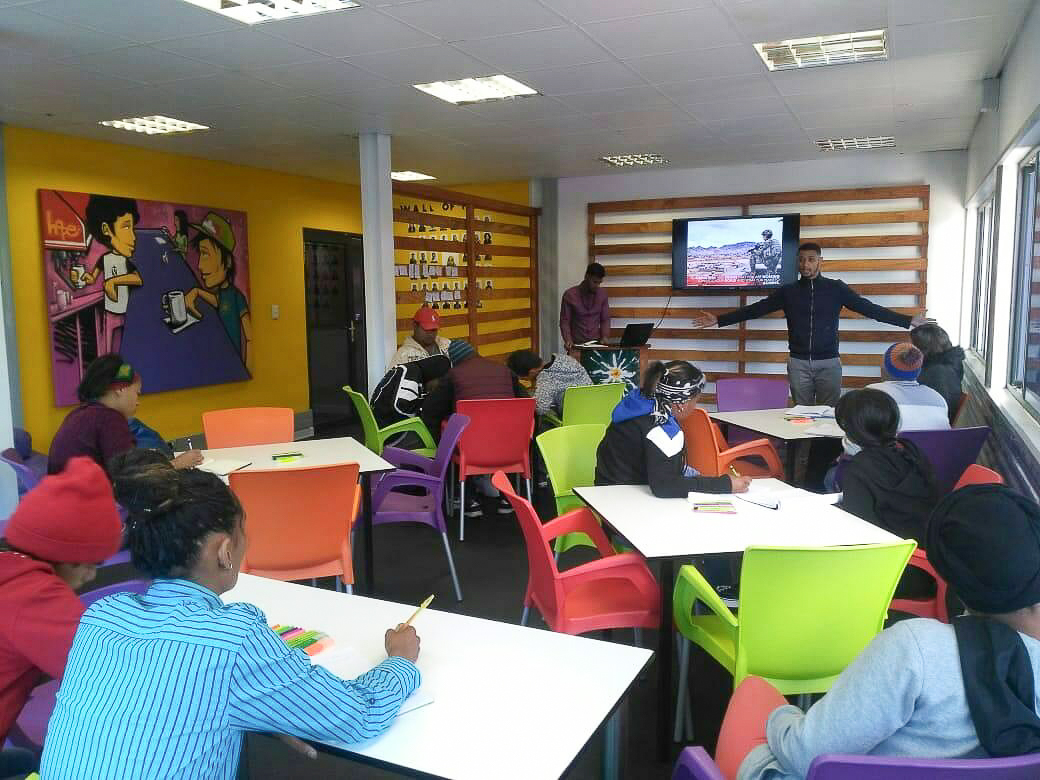 Part of the Provincial Youth Development Strategy, the Youth Cafés provide much more than a cup of good coffee.
Part of the Provincial Youth Development Strategy, the Youth Cafés provide much more than a cup of good coffee.
They offer a free platform where the youth can access skills and personal development training, mentoring, computers and the internet, wellness programmes and a supportive, caring environment.
Last year, over 15 000 youth benefitted from the services offered by the Youth Cafés.
“Youth Cafés provide an invaluable service to many of our communities throughout the province as they empower the youth with a sense of personal accountability and upskill them. Through the programmes, the youth are exposed to opportunities available at TVET institutions and other linkages,” explains Western Cape Government Media Liaison Officer Cayla Murray.
Each of the nine Youth Cafés are designed to suit the needs of the surrounding communities.
For example, in Nyanga, the café focuses on combining the sport of soccer with personal development. Meanwhile, the Youth Café in Mitchell’s Plain offers training in fields such as digital technology, business development and creative design.
Programmes at the cafés are supported by expert partners such as RLabs, Amandla EduFootball, the Sozo Foundation and Stuff Film Academy, to ensure that training is of a high quality.
Alishia Soman (21) is an intern at the Youth Café in Oudtshoorn. She started going to the café as a youth, taking life skills courses.
“I learnt a lot through the life skills courses. The café is really helping many youths with opportunities to improve themselves,” said Soman.
The café helped Soman find her passion and made her realise what she wanted to do.
“I realised that I want to become a part of the solution for youth. So I started at the centre as a volunteer, and then I became an intern. After my internship, I hope to be employed by the café full time, working in the life skills programmes,” she said.
Want to become a member of a Youth Café? All you need is to be between the ages of 16 and 25, and be in possession of an ID or birth certificate. For more information, visit www.westerncape.gov.za/youth-cafe/.
Why you should register to vote?
Why you should register to vote? vuyelwanRegister to vote
The Independent Electoral Commission is urging young South Africans to register to vote.
Taking part in the elections is your chance to have a say in who is tasked with governing the country.
The decisions taken by these elected officials will have a direct impact on your everyday life.
With the final registration weekend taking place on 26 and 27 January, the Independent Electoral Commission (IEC) explains why registering to vote in the 2019 General Elections should be a priority for all South African residents over the age of 18.
“The elections are your chance to have a direct say in who runs your country, province and /or community and ward, and by casting your ballot, it allows for your voice to be heard and so doing, having that vote ‘count’,” said Chief Communication Officer for the IEC, Kate Bapela. 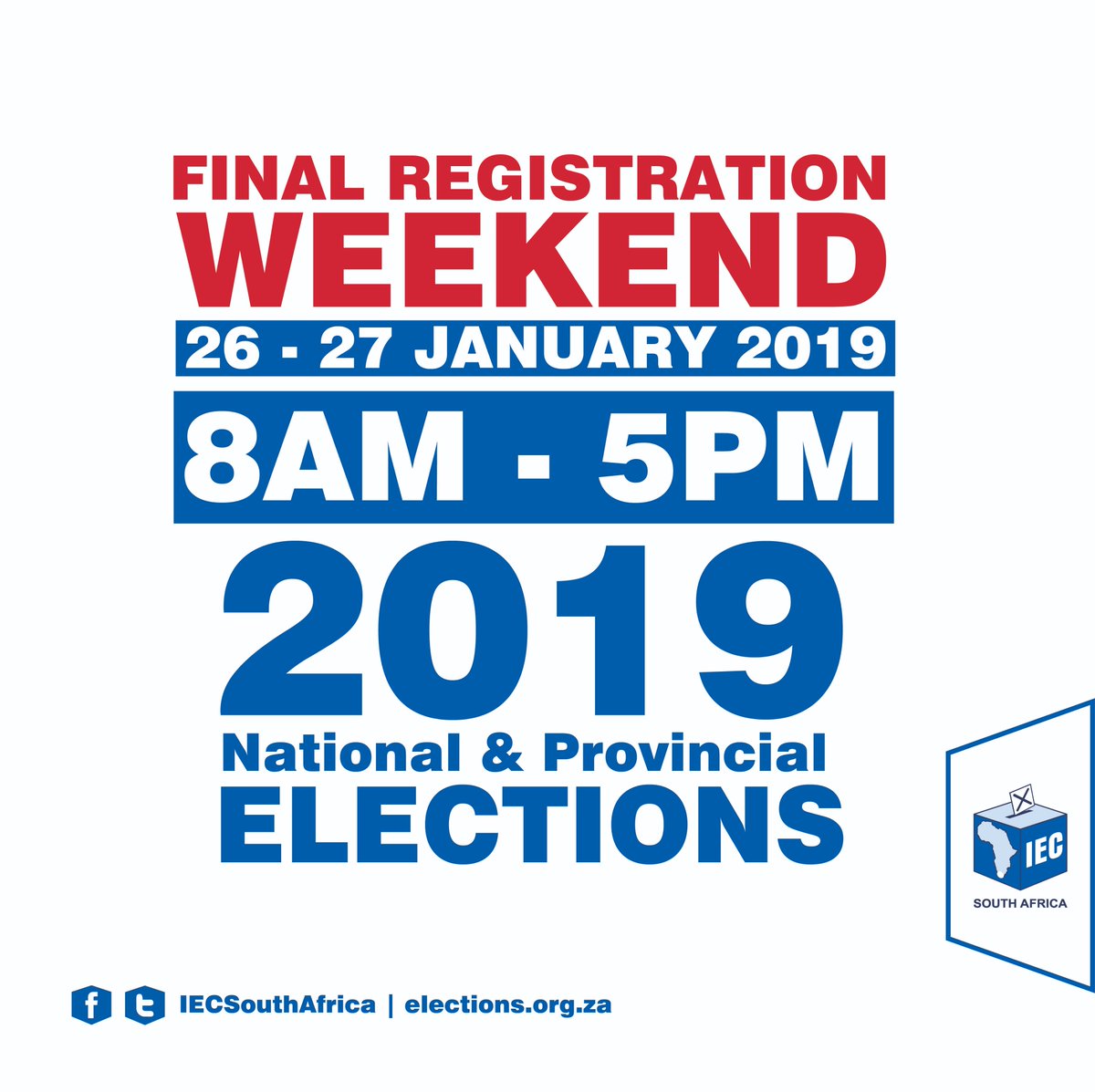
The elections are also key to ensuring that the elected government represents the majority of people in the country.
“The IEC appeals to all stakeholders including political parties, government departments and entities, the media and civil society organisations including labour, business, NGOs, faith-based organisations, traditional leaders and all community organisations to support the registration drive and encourage voter registration ahead of the elections.”
Bapela adds that special attention is being paid to getting young people to register to vote.
“A key area of our registration drive has been to urge young, first-time voters to register. Currently, the lowest voter registration levels are for voters aged 18 to 19 (15.6 percent of estimated eligible population) and 20 to 29 (56.7 percent of the estimated eligible population).”
To play their part in our democracy, it is also important for voters who have already registered to confirm and update their address details.
“The Commission is hopeful that voters who are already registered will use the opportunity to visit their voting station to check their registration and specifically to confirm and update their address details on 26 and 27 January 2019,” Bapela urges.
“Please use your opportunity to vote in the 2019 elections.”
Registered voters can visit the IEC website (www.elections.org.za) to check their current registration details and voting station. They can also SMS their ID number to 32810 to receive an SMS containing the address of their voting station.
